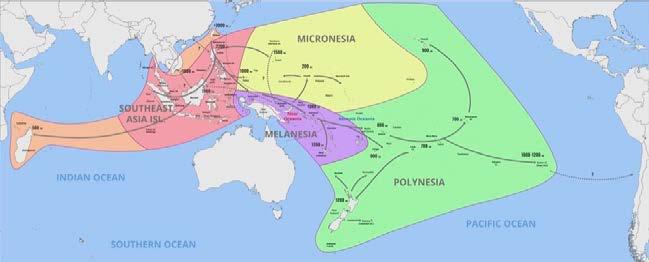
6 minute read
Bungee Jumping into the 21st Century: Health in Vanuatu and the Blue Pacific
Dr Graham Sivyer MBBS [Hons], FRACGP, FSCCA grahamwsivyer@hotmail.com
A Brief Summary of History and Politics of the Pacific
Advertisement
Around 3000 BC. the people of the Lapita culture (named after the archaeological site first excavated in New Caledonia) commenced populating the islands of Indonesia, the Philippines and New Guinea. Genetic, archeological and linguistic studies indicate that these people sailed from Taiwan and the southern islands of Japan – there are some Maori words similar to those of Japan.
Around 1500 – 1300 BC, the population of Micronesia and Melanesia occurred with extension outwards to colonise Polynesia over the following 500 years. Hawaii was colonised around 900 AD and New Zealand, the last to be colonised, around 1200 AD.
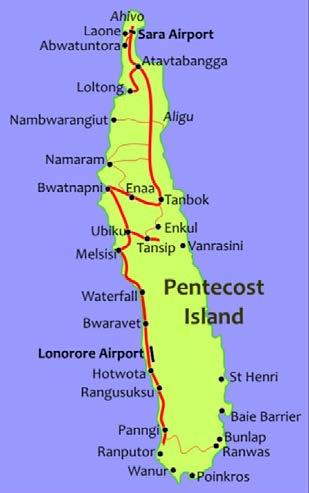
‘Pacific’ was the name given to this vast ocean by Ferdinand Magellan in the 16th century because it was peaceful and unlike the ‘stormy’ Atlantic. ‘Oceania’ is the name given to the 8.5 million square kilometre water-land mass, which also includes New Guinea and Hawaii.
The area now called ‘Blue Pacific’ (by the Pacific Island Forum) excludes western New Guinea (claimed by Indonesia) and Hawaii (the 50th state of the United States of America). Western countries started to ‘discover’ and claim the islands in the Pacific from around 500 years ago. These countries included Portugal, Spain, England, France, Germany and the USA. More than eighteen islands have gained their independence within the last century and despite of individual independence, are loosely governed by the Pacific Island Forum.
The Pacific Island Forum (PIF) was formed in 1971, and includes Australia and New Zealand and sixteen Pacific islands. The PIF meets annually, is based on the UN Charter, and their vision is one of “good governance, democratic values, rule of law, human rights, gender equality and just societies.”
Western ‘colonisation’ has not been kind to the Blue Pacific. It has resulted in damage to local cultures, ‘black birding’ of islanders, river run-off resulting in acidification and coral reef damage, plastic accumulation (an area of the size of France in the north eastern Pacific), climate change with rising water levels, nuclear damage and waste, and the introduction of the western diet. The primary concern of the PIF is climate change.
A health survey of Vanuatu by DFAT, in 2015, as an example of one of the Blue Pacific islands, indicated high infant mortality, low vaccination uptake, childhood malnutrition and adult obesity with increasing cases of ‘western disease’ such as diabetes and heart disease.
Australia and New Zealand are the major donors of aid to the PIF countries. In the financial year
2019 to 2020, DFAT donated $1,381.4 million to eleven Blue Pacific countries. This distribution included $572.2 million to Papua New Guinea, $187 million to the Solomons, $66.2 million to Vanuatu and $58.1 million to Fiji. Of the $66.2 million donated to Vanuatu, $15 million was directed towards health. The agreement with DFAT was to direct the health funds to hospitals, village health workers, malaria prevention and immunisation.
The number of public and private hospitals in Australia and New Zealand totals 1,350 with one hospital per 18,500 of population. The number of hospitals in the Blue Pacific totals 95 with one hospital per 189,000. The number of available medical schools in Australia and New Zealand is twenty-three, with one medical school per 1,370,000 population. Medical schools in the Blue Pacific total six, with one school per 3,000,000 population.
Mauna Health Centre Pentecost Island: A Case Study
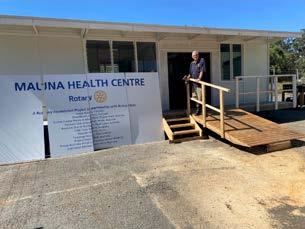
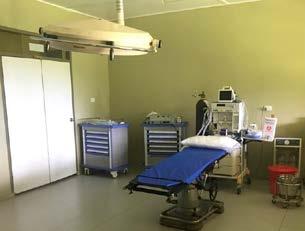
Vanuatu is a volcanic archipelago of islands stretching over approximately 1,000 kilometres and situated about 1,500 kilometres to the north east of Australia and between the Solomon and Fiji islands. There are 83 islands inhabited with approximately 40 different languages spoken. Bislama (pigeon English), English, French and local dialect are languages spoken in Vanuatu.
The capital of Vanuatu is Port Vila on the island of Efate. Vanuatu has a total population of around 318,000. Pentecost Island to the north east of Efate has a population of around 18,000. The island is home to bungee jumping (southern Pentecost) which is a ritual associated with the annual yam harvest.
Mauna Health centre is situated towards the northern tip of Pentecost in the village of Abwatuntera. Mauna, which in local dialect means ‘cry no more’, was established as a ‘hospital’ in 1951.
In 2019, Dr Richard Leona, now the chief of surgery, Vanuatu and a tribal chief on Pentecost, spoke at the AGM of the Gold Coast Medical Association (GCMA). He had recently arranged and built a surgical theatre in the Mauna Health centre, and requested assistance in adding a portable XR and ‘pathology auto-analyser’ to complement the theatre. At this meeting, a number of medical practitioners and rotarians decided to assist Dr Leona in his request.
In October 2019, a group of doctors and rotarians flew to Port Vila. The following day we flew to Lonorore airport in the south of Pentecost. We were introduced to local chiefs and health care workers. The group including ‘local dignitaries’ and at times totalling ten persons (maximum seating usually five persons) drove by four-wheel drive utility, winding along an unpaved boulder littered road called ‘Highway One’. We traversed rivers and mountains to arrive at Mauna in the north after eight hours.
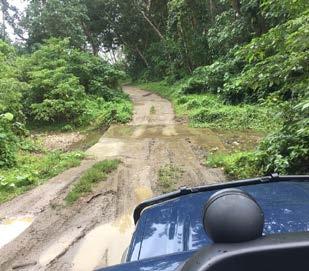
During the trip we stopped at a number of health centres to inspect the facilities and to be welcomed by village health workers. It was obvious that Dr Leona was well respected throughout Pentecost as at every stop we were treated to food, gifts and a welcome by the local chief.
Mauna health centre provides care to obstetric, medical, trauma and paediatric patients. The centre also provides out-patient care and a vaccination program. Seriously ill patients require transport to the airport (Lonorore) in the south of Pentecost about six hours on a four-wheel drive road, or a four-hour outboard boat ride. Hot water and electricity at Mauna is virtually nonexistent. A few solar panels and diesel-generated electricity are used to charge torches and phones.
The visiting group agreed that an XR and autoanalyser pathology system as requested by Dr. Leona would be a valuable asset to the centre. Rotary International has provided matching grants for the money raised by Broadbeach, Surfers Sunrise, Gold Coast, Tauranga and Kasoke Rotary Clubs to pay for the portable XR and pathology auto-analyser. Both items of equipment have been purchased from the Chinese Company, Healicom. These have recently been shipped from China and will arrive in Port Vila within the next month.
The local Rotary district has funded the building of an annexe to be erected next to the theatre at Mauna which is to house the XR and Pathology systems. Solar-generated electricity will be arranged with solar panels and appropriate wiring to the annexe. Over the last few years this annexe has been built to cyclone resistant standards, disassembled, flat-packed and is now being transported by container ship to Vanuatu.
The work on the annexe has been carried out by volunteers at the Men’s Shed in Arundel on the Gold Coast. A group of eight volunteers, depending upon recovery from the recent cyclones, will be traveling to Pentecost and assisted by villagers, will reassemble the annexe at Mauna.
Once the annexe has been reassembled and the portable XR machine and blood pathology auto-analyser installed in Mauna we will be seeking volunteers from the Gold Coast medical community to travel to Pentecost as a ‘Vocational Training Team’ to assist managing the equipment.
Pentecost Island is a wonderful mountainous tropical island inhabited by a welcoming people. Most of the islanders exist through subsistence farming of crops and fishing. They are dependent on such visionaries as Ni-Vanuatans, Dr Leona who work hard in difficult circumstances to bring Vanuatu into the 21st Century.
Australians and New Zealanders are held in high esteem and they look to us for help improving their living standards. New Zealand, as a Polynesian island, is considered one of their own. They are grateful for the role of DFAT and the opportunities provided by our government through for example work visas. They do have concerns about the role of China in the pacific but are happy to negotiate, with the proviso, as stated by Rory Medcalf, National Security College ANU: “China has a rightful place in the Pacific, just not the right to dominate.”
Vanuatu and the islands of the Blue Pacific have suffered immensely over the last half century, particularly with increasing and more ferocious cyclones. The concern of all the people of the Blue Pacific is climate change
Involvement with the people of Vanuatu and in particular, working and learning from Dr Richard Leona, has been an immensely rewarding and enriching experience. I hope to continue my association with Richard and the Blue Pacific over subsequent years.
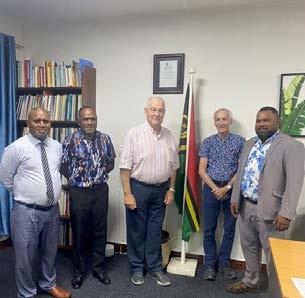
Our experienced team of radiation oncologists - bringing your patients innovative non-melanoma skin cancer treatment
A/Prof. Sid Baxi
Radiation Oncologist, Regional Medical Director
Tugun - John Flynn Private Hospital
Prof. David Christie
Radiation Oncologist
Tel: 07 5507 3600 | receptiononcologytugun@genesiscare.com
Southport - Premion Place
Tel: 07 5552 1400 | receptiononcologysthport@genesiscare.com

Satellite Clinics: Beenleigh, Ballina newface.genesiscare.com
Over the past couple of years’ it is with much sadness that we have personally handled an increase in some devastating Claims for our GPs & Specialists for Trauma, Total and Permanent Disability & Death Cover lump sum Claim proceeds.
This reflects the importance of having the correct ‘safety net’ of Life Insurance Covers in place for the unexpected & unthinkable!
— Martin, Paul & Katrina
Dr Selena Young
Radiation Oncologist








